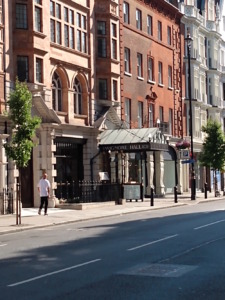
Wigmore Hall. Photo Nick Breckenfield
Upon my arrival at St. Pancras Station on Saturday morning 10 June, I took a black cab to the Wigmore Hall. The driver asked me what brought me to London. After explaining about the BBT being an organisation which supports young musicians, he told me that he himself played the piano as well as the guitar, but found it difficult to keep up the discipline of practicing every day in combination with the long days of his job as a driver.
I arrived at the Wigmore Hall just in time to listen to the last hour of the rehearsal for that evening’s concert. Mitsuko Uchida and James Newby were rehearsing Mahler’s Rückert Lieder. It struck me how avid Uchida was on getting opinions from people in the hall about the balance. She explained she had encountered a famous pianist once (“his name should not be mentioned”, she jokingly said) who only realised after having already played chamber music for 30 years of his life, that his own perception of his sound could not match that of the audience, because the music stand on the piano blocks much of the sound for the player.
In any case, with Uchida there was absolutely no question of the balance being less than perfect at all times, because she matched her timbre on the Steinway seemingly effortlessly to all the different sound colours which Newby was making with his voice. With the utmost care and precision, Newby placed the text of the songs into the Wigmore Hall.
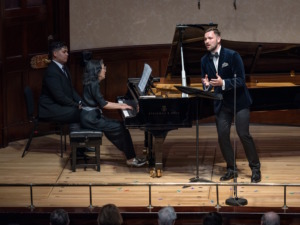
BBT20. Mitsuko Uchida and James Newby perform Mahler’s Rückert-Lieder. Photo Simon Weir
Uchida and Newby’s music making made it seem like the Wigmore Hall with its wonderful acoustics was probably built for Lied repertoire, as well as any other type of intimate chamber music. Uchida’s silky touch of the keyboard seemed to transcend space and time, as if not her own hands but something else outside of her was producing the sound. Later that afternoon I discussed this with BBT artist and great pianist Filippo Gorini, who told Uchida he wished he could ‘borrow her touch’ for once, to which she replied that the only way in which she can explain her approach to piano playing, is that she never feels like she ‘plays on the piano’, which I thought was a very revealing remark.
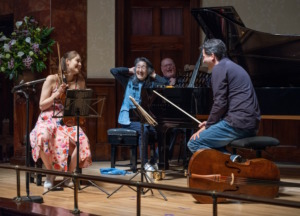
BBT20. Geneva Lewis, Mitsuko Uchida, (Nick Breckenfield) & Christian Poltéra. Photo Simon Weir
During the second part of the rehearsal with Geneva Lewis and Christian Poltéra, Uchida made other interesting as well as witty remarks. Asking the listeners in the hall for their opinion on the balance again, she said that she wants to be careful when the violin and cello are playing, but ‘when I am alone, I bang’, jokingly demonstrating the so-called ‘banging’ on the piano. Uchida’s jokes made the atmosphere relaxed, she seemed to have the effect on everyone around her to feel comfortable. During the mysterious beginning of Schubert’s Notturno, the sound of the violin, cello and piano seemed to melt together. After playing the piece through once, Uchida made a seemingly simple suggestion; ‘let’s play it again, because by playing it things happen’, meaning they would find even more inspiration in the piece by just exploring the music once more.
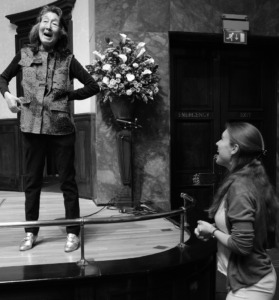
BBT20. Mitsuko Uchida meets Lucie Horsch, Wigmore Hall 10 June 2023. Photo Simon Weir
What was happening in the Wigmore Hall this morning, was clearly music making of the highest level, by – rather than wasting time on details – just playing the music in order to understand it and give meaning to it. After the beautiful ending of the Notturno there was a perfect silence in the hall. Uchida said that she loved to create a silence after the last note of this piece, but she also said that whether this succeeds depends very much on the audience. After playing the Notturno for the second time Uchida delighted us with another wise remark, something along the lines of: now it be will be the challenge for us to play the first time tonight as if it is the second time, and therefore feel even more free.
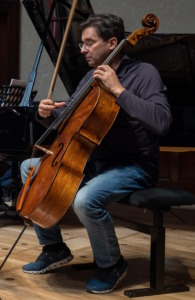
BBT20. Christian Poltéra. Photo Simon Weir
When I listened to the concert that same evening, the whole audience in the Wigmore Hall seemed to exhale simultaneously after the last note had sounded. The beautiful silence lasted several seconds, so we could say: mission accomplished. During the intermission I chatted with Christian Poltéra about his relationship to the BBT. Having received his Fellowship in 2004 – the BBT had just been founded a year earlier – Poltéra became one of the first members of the BBT family. According to him, receiving financial support is in itself great and of course very necessary for young musicians, but this is also possible by for example winning a prize at a competition.
However, what makes the BBT unique, is the team behind it which offers support to the musicians in many more ways than just financially. Especially in the arts, it is necessary for artists to feel trusted, to receive recognition as well as advice and to have people around them they can exchange with, and the BBT facilitates all of these things.
This conversation with Poltéra reminded me of an experience I had a few weeks before coming to London. I was invited to take part in a panel in my home country of the Netherlands to talk about the arts with people who work in the cultural sector. An influential Dutch writer and philosopher opened the conversation by telling us her theory on what the arts need in order to flourish. In her view, the three essential elements for the creation and survival of the arts, are time, space and attention. Applied to music specifically, it means we firstly need to invest time in composing, practising and performing music. Secondly, we need to create contexts and spaces to make music in and thirdly, maybe most importantly, music has to be listened to, brought under the attention and recognised as something important.
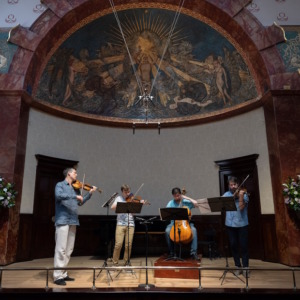
BBT20. Apollon Musagète Quartet. Photo Simon Weir
I realised that the BBT as an organisation, facilitates exactly these three elements. They give musicians a time span in which they are allowed to brainstorm and develop projects, they give them the space and the opportunity to realise their artistic ideas, and most importantly they offer a listening ear, they give the musicians their undivided attention and support while they are accomplishing their dream projects.
After the interval, the programme was concluded with one of Schubert’s masterpieces, the quartet ‘Der Tod und das Mädchen’, performed by the wonderful Apollon Musagète Quartet. The decorations of the Wigmore Hall with Apollo in the cupola above the stage and his muses on the walls around him seemed to come alive while they were playing Schubert’s music.
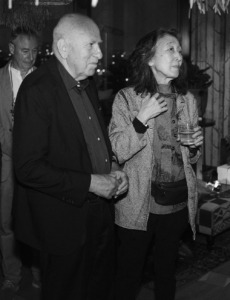
BBT20: Martijn Sanders and Mitsuko Uchida. Photo Simon Weir
After the concert, I spoke with Martijn Sanders (a former member of BBT’s Artistic Committee) and his wife. We agreed that it felt very fitting that the anniversary weekend of the BBT was centered around concerts at the Wigmore Hall, with as its most important part music being played and listened to. Mrs. Sanders then said something profound. She believes that music like no other thing in life can teach us to truly listen and be open to each other.
After these wonderful performances, the BBT team and the musicians of that evening’s concert all went for drinks at the pub Cock & Lion close to the Wigmore Hall. To me, the anniversary weekend almost felt like a mini music festival. It was a great opportunity to meet fellow musicians and talk with them about music and about life.
On Sunday, there was a morning concert planned at the Wigmore Hall with a programme solely dedicated to music of Johann Sebastian Bach, played on four different instruments. Sivan Magen opened the concert on the harp with his own arrangement of the Chromatic Fantasy and Fugue. The determination and focus with which he managed to capture the complexity of Bach’s music, drew in all the listeners. Magen filled the hall with the majestic harmonies and sound world of Bach, proving with his masterful arrangement once more the potential of Bach’s music to be adapted for many different instruments without it losing its true essence. After this wonderful opening of the programme, Simone Rubino performed part of the Third Solo Cello Suite on marimba. It was surprising how quickly our ears adjusted to the new sound world of his instrument. Rubino made the music flow and dance with his creative timing.
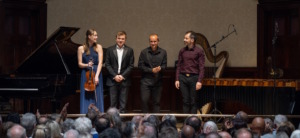
BBT20. Geneva Lewis, Filippo Gorini, Simone Rubino and Sivan Magen. Photo Simon Weir
Then followed two contrapunctus movements from The Art of Fugue, played masterfully by Filippo Gorini on piano. With a lot of fantasy and dynamic contrasts he managed to seize the polyphonic structures of the music and conveyed them to the audience. The concert was concluded by Geneva Lewis, playing the famous and technically demanding Chaconne from the Second Violin Partita. The gradual build-up from beginning till end was impressive. Lewis transmitted the grand structure of the majestic Chaconne, while at the same time not overlooking the details of the different sections of the piece. The audience could feel that she gave all of herself to the music and her performance received a big applause.
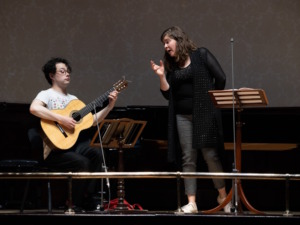
BBT20. Sean Shibe and Ema Nikolobska. Photo Simon Weir
That same day in the afternoon I managed to catch a few minutes of the rehearsal for the evening’s final concert. Guitarist Sean Shibe and mezzo soprano Ema Nikolovska were exploring the sound worlds of three English composers: John Dowland, Benjamin Britten and Thomas Adès. I was immediately taken by the originality of their choice of repertoire and their musicality and versatility.
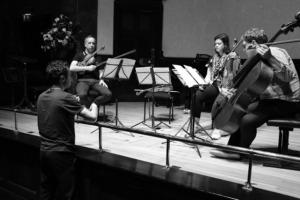
BBT20. Quatuor Ébène. Photo Simon Weir
After that, it was the Quatuor Ébène’s turn to rehearse their pieces. It struck me with how much drive they used every minute of their rehearsal time to deepen even further their interpretation of a piece which they clearly already knew very well, the exuberant string quartet of Maurice Ravel. Their incredible work ethic and artistic professionalism made me realise that it is probably exactly because of these traits that they have been able to reach the absolute highest level of string quartet playing. Second violinist Gabriel walked several times into the hall to listen and would give remarks to the other three musicians on the balance, sound colours and timing. It was very inspiring to witness their artistic process.
When the rehearsal was over, Mitsuko Uchida came back into the Wigmore Hall, carrying a big paper bag. She chatted with Sean and Ema and told them she had bought different cakes for all the musicians of that evening’s concert to enjoy after their rehearsals. Her kindness and generosity towards all the musicians who were there that weekend kept surprising me.
The final Sunday evening concert was even more magical than the snippets which I had heard during the rehearsals. It was a wonderful coming-together of musicians from different BBT generations. After the concert it was time for everyone to head to the rooftop bar of the Tree House Hotel – aptly called ‘The Nest,’ for the celebratory reception concluding this wonderful anniversary weekend.
That evening I had many very interesting conversations with musicians and with the BBT team, but what possibly stuck with me most was a part of Ilaria Borletti Buitoni’s speech. She said that music is one of the very few things in life that can touch our minds, hearts and influence our emotions in such an immediate and direct way. We therefore need music now more than ever, to remind us of our humanity in a time where technology seems to dominate many aspects of our lives. Ilaria stated that today’s musicians have a very important task in providing music, so we can all be reminded of our humanity.
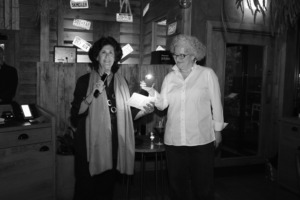
BBT20 Ilaria Borletti Buitoni’s speech. Photo Simon Weir
If there is one thing which I will take away from the BBT weekend, it would be exactly that. We have to be grateful that an organisation like the BBT exists, making it possible that young musicians are given the opportunity to express their voices through their unique artistic projects.